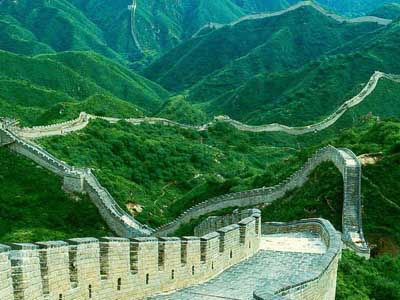| Tools: Save | Print | E-mail | Most Read |
| Great Wall May Fall Out of 'New' Seven Wonders List |
| Adjust font size: |
China's Great Wall may not be named one of the "new" Seven Wonders of the World because few Chinese are willing to cast a vote for it, the Great Wall administrators have said. Nearly 50 million votes have so far been cast in a campaign by the non-profit New7Wonders Foundation to choose the world's "new" seven wonders out of 21 short-listed historical buildings or monuments. The votes are being cast online or via phone messages. The competition closes July 7 when the result is due to be announced in Lisbon. The Great Wall so far has fewer than 150,000 votes, and will probably drop out of the "new" Seven Wonders list, administrators of the Great Wall said. "The Great Wall has received fewer votes even than some TV shows," said Xie Jiuzhong, a spokesman of the Great Wall management, earlier this week, adding that most of the votes for the Great Wall had come from foreigners. "China's Great Wall missed an opportunity 2,000 years ago when the Greeks named the Seven Wonders of the World," said Xie. "It would be extremely regrettable if it failed to enter the "new" Seven Wonders this time," he said. The New7Wonders Foundation was set up in 2001 by Swiss-Canadian adventurer Bernard Weber to protect humanity's heritage. The contest has caused a lot of controversy in China, however. Many doubt the authority of the foundation and suspect that the event is commercial. Although the online voting is free, it charges one yuan for each SMS vote. But Dong Yaohui, vice president of the Great Wall Academy, said for every yuan of income from SMS, 50 cents will be used on heritage protection, and the Great Wall might be a beneficiary. Sui Rui, CEO of N-VISIO, the company in charge of the project's SMS service in China, said 30 percent of the SMS revenue would go to the mobile phone service operator. Shan Jixiang, director general of the State Administration of Cultural Heritage of China, said the government would neither support or reject such a project. But he said it was good for boosting public awareness of world heritage. The organizers say that they are trying to get ordinary people to follow the spirit behind the ancient Seven Wonders selected by intellectuals in the Mediterranean and Middle East around 200 B.C. Only one of them, the Great Pyramid of Giza in Egypt, still survives. Egypt's pyramid was granted the status of honorary "new" Seven Wonders candidate -- and removed from voting -- after Egyptian authorities protested that its historical value could not be called into question. Egyptian antiquities sup-remo Zahi Hawass dismissed the contest as a "publicity stunt" even after the change earlier this year. In the most recent count published May 7, the top 10 were the Acropolis in Greece, the ancient Mayan city of Chichen Itza in Mexico, the Coliseum in Rome, the Eiffel Tower in Paris, the Great Wall of China, the Incan ruins of Machu Picchu, Petra in Jordan, the statues on Easter Island, Britain's Stonehenge, and the Taj Mahal in India. The other short-listed sites include the Angkor Wat temples in Cambodia, the Alhambra in Granada, Spain, the Hagia Sophia in Istanbul, the Kiyomizu Temple in Japan, Moscow's Kremlin and Red Square, Neuschwanstein Castle in southern Germany, New York's Statue of Liberty, the statue of Christ the Redeemer overlooking Rio de Janeiro, Sydney Opera House, and the ancient city of Timbuktu in Mali. The shortlist was chosen by a panel of world-renowned architects and ex-UNESCO chief Federico Mayor, in January 2006, out of 77 public nominations. The Great Wall is China's only candidate. With a history of more than 2,000 years, the Great Wall was enlisted in the World Heritage by UNESCO in 1987. Just like a gigantic dragon, the Great Wall winds up and down across deserts, grasslands, mountains and plateaus, stretching approximately 6,700 kilometers from east to west China.
(Shenzhen Daily June 21, 2007) |
| Tools: Save | Print | E-mail | Most Read |
 |
| Related Stories |
